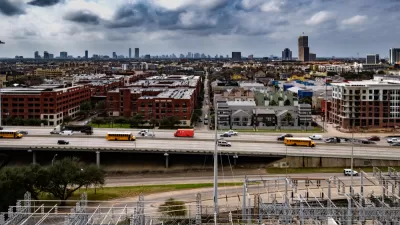A pair of articles from the Dallas Morning News examine the inequities of property tax rates in Texas. Under the current system, commercial property owners in Dallas County "shaved more than $4.8 billion off preliminary tax appraisals."
An article by Matthew Watkins explains Texas' property tax system and the imbalanced tax burden it creates for homeowners relative to commercial property owners.
"The Texas Constitution provides two ways for property owners to make their case [in reducing their taxable values]. Homeowners usually cite market value, claiming they couldn’t sell their houses for the amount the appraisal district claims they are worth."
Commercial property owners, however, "usually prefer another tactic, Nolan said. They argue that they aren’t being taxed 'equally and uniformly.' That essentially means a property owner thinks his peers — the owners of other multimillion-dollar buildings — got valuations much lower than his. If so, that’s a violation of the owner’s rights under the state constitution."
Since that system was enacted in 1998, challenges to appraisals of commercial property value in Texas have skyrocketed. In 2013, in Dallas County alone, commercial property owners reduced their initial appraised value by more than $4.8 billion. "That’s more than seven times the reduction secured by residential property owners," explains Watkins.
Resistance to the system is growing, including demonstrations in San Antonio in April and threats of legal action in Harris County, where commissioners "threatened to sue the local appraisal district after a shopping center sold for nearly $200 million more than its appraised value…" Steve Blow followed the article by Watkins with an editorial calling for the state to make the property tax appraisal system fair for all Texans. He cites the work of advocacy group Real Values for Texas in achieving that goal. Blow's case: "If we must pay taxes, we at least want them to be fair. And in Texas, that’s less and less the case."
FULL STORY: Tax law leads to towering savings for big-building owners

Alabama: Trump Terminates Settlements for Black Communities Harmed By Raw Sewage
Trump deemed the landmark civil rights agreement “illegal DEI and environmental justice policy.”

Study: Maui’s Plan to Convert Vacation Rentals to Long-Term Housing Could Cause Nearly $1 Billion Economic Loss
The plan would reduce visitor accommodation by 25% resulting in 1,900 jobs lost.

Why Should We Subsidize Public Transportation?
Many public transit agencies face financial stress due to rising costs, declining fare revenue, and declining subsidies. Transit advocates must provide a strong business case for increasing public transit funding.

Wind Energy on the Rise Despite Federal Policy Reversal
The Trump administration is revoking federal support for renewable energy, but demand for new projects continues unabated.

Passengers Flock to Caltrain After Electrification
The new electric trains are running faster and more reliably, leading to strong ridership growth on the Bay Area rail system.

Texas Churches Rally Behind ‘Yes in God’s Back Yard’ Legislation
Religious leaders want the state to reduce zoning regulations to streamline leasing church-owned land to housing developers.
Urban Design for Planners 1: Software Tools
This six-course series explores essential urban design concepts using open source software and equips planners with the tools they need to participate fully in the urban design process.
Planning for Universal Design
Learn the tools for implementing Universal Design in planning regulations.
Caltrans
Smith Gee Studio
Institute for Housing and Urban Development Studies (IHS)
City of Grandview
Harvard GSD Executive Education
Toledo-Lucas County Plan Commissions
Salt Lake City
NYU Wagner Graduate School of Public Service





























